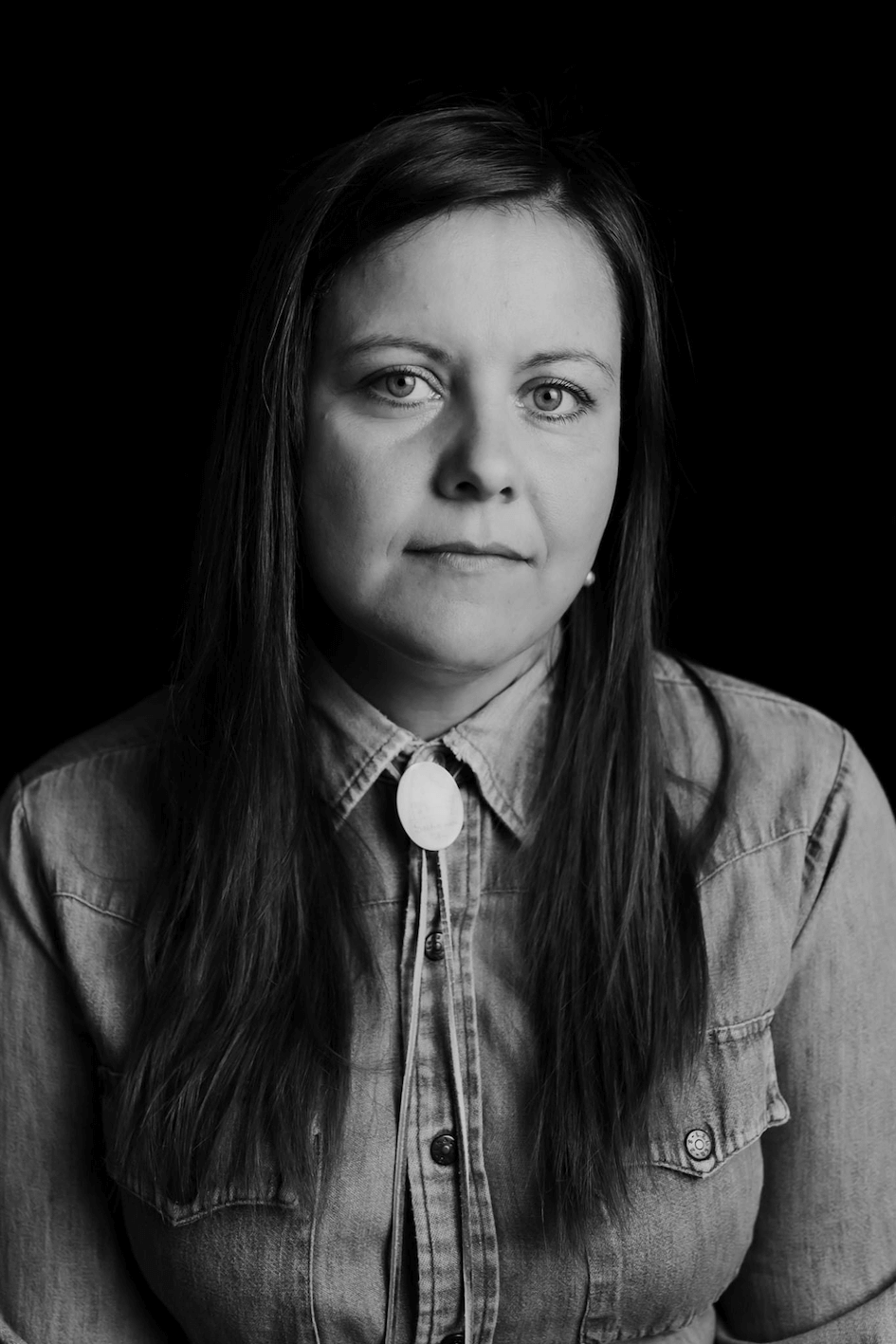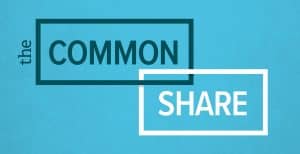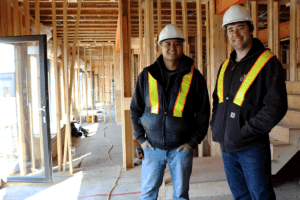Canada’s media industry is in a tough spot. As many newsrooms and publications go out of print, the writing on the wall doesn’t look good for those who read, work for, or benefit from traditional media sources. But the group of writer’s behind New Feeling Co-op are trying to change this narrative. In this episode of the Common Share, we speak with New Feeling steering member Lenore Maier on how writers across the country are using a multi-stakeholder co-operative to make journalism on Canada’s music industry more sustainable.
For more on New Feeling, find them on Twitter and Instagram at @newfeelingcoop.
Podcast Transcript
Tanner Bayne: Welcome to the Common Share — a podcast about co-operative businesses. I’m Tanner Bayne, with Co-operatives First an organization that promotes co-operative business development in rural and Indigenous communities across Western Canada. We are located in Saskatoon, Saskatchewan, on Treaty Six Territory, the traditional homeland of the Métis people.
For more information on us and all the work that we do, head on over to cooperativesfirst.com. If you need resources for starting your own cooperative, check out coopcreator.com. This is a great resource site that has everything you need to get a co-op up and running. Now let’s get to the episode.
It’s no news that Canada’s media industry is struggling.
You can see it in slimming page counts, layoffs, disappearing ad revenue, and in media outlet closures. It’s estimated that more than 250 Canadian newspapers alone have shut down since 2013. News Media Canada, a group that represents over 830 Canadian newspapers, even says that the nation’s media industry is in the middle of a market failure.
And the COVID 19 pandemic did no favours for this ailing industry.
Despite these challenges, a group of writers came together last year in the middle of the pandemic to start a media publication — about music, no less.
New Feeling is a cross-Canadian multi-stakeholder music writer’s collective that’s using the co-op model to make music writing more sustainable. And for the folks that are in the middle of creating New Feeling, the pandemic was the right time to begin.
Lenore Maier: I don’t want to say good things about the pandemic. But I mean, it’s allowed people to think about certain things differently.
TB: This is Lenore Maier. Lenore is a Saskatoon-based musician, a self-described “hack writer,” and of New Feeling’s steering members.
LM: I think the pandemic has just provided the ability for music writers to start thinking more about owning the work that they produce, to truly own the work they produce and allowing to share power and control equally among folks, instead of having it sort of located in a very, like, uneven balance. But I mean, these ideas have been percolating in people’s brains for a long time, especially journalists who work in the who understands what it’s like to work in these types of jobs.
TB: For those who don’t know what it’s like to work as a music writer, a line from a line from New Feeling’s mission statement explains it well. It reads “The future of music journalism in the country seems dismal and it doesn’t have to be.”
TB: The writers behind the co-op say that few publications in Canada are adequately covering the nation’s music industry. And when the outlets that do begin to face budget cuts, that music sections — and the jobs for those writing them — are the first to go.
So they chose to start a coop to make their work more sustainable. Lenore explains to me why co-operative aspects like ownership, democratic decision making, and a the potential for a more horizontal business structure, were part of that decision.
LM: Its a situation where everybody involved, whether from, you know, music musicians to the people who write about them are often I guess, exploited or, like, the terms are never there. So you’re often just sort of at the whim of whatever, someone else kind of says you’re worth. And oftentimes, it’s much less than you actually are worth. And as, as someone who’s primarily a musician, before a writer, or a journalist, it it’s something that’s, it’s totally universal across both. And I guess New Feeling is a is a group of folks that, see that for what it is, and, and making tangible decisions together. To to change that, and to change that landscaping, Canadian music. And that’s exactly what it is, is everybody seeing that for, for what it is and just kind of like, not accepting it. Like, sometimes it’s really easy to be like, Well, you know, this sucks, but let’s continue on. But a New Feeling is kind of putting their heels in the dirt a bit and saying we can change this. And we can we can make things better for the folks who are really working passionately in these in these fields and stuff. So yeah, it doesn’t have to be we can we can make it better, but doing it together as the real. Can’t do it alone.
TB: And though New Feeling was conceptualized initially by a group of music writers, they don’t plan on doing it alone. As a multi-stakeholder co-op, New Feeling aims to include musicians, community members, and more into the mix of its members.
LM: We’re also looking at eventually having not only writers involved, but also musicians, and just community members to help shape to help shape these types of things. And we’ve been talking about the idea of using time banks for, you know, some organizers like myself, for example, who are putting in time and, and being really transparent about any funds we do have, where they’re going. And just having anyone who’s involved in a co op is, is able to have a completely transparent look at what we’re doing with funds. And it’s a very like long term game, because when you’re just starting out with no sort of revenue source, so you know, we’re looking at all the different options we can, but we are sort of pausing, or have paused so that we can really tackle that piece, because it’s a really big one.
I think that the multi-stakeholder model is because New Feeling cares a lot about what the community has to say, and what musicians have to say. It’s not just what the writers have to say, even though that is important, and writers are really sort of the center of it. But I mean, we want to be accountable to the community and to the musicians and music scene that we’re writing about. We want to be focused on community want to be transparent. And in order to do that, I feel like it needs to be multi stakeholder, at least in terms of the vision that that folks in your feeling have. Like, I think it’s like essential pieces of people playing different roles, but they’re essential in order to have it function properly. This this is this is my own personal kind of idea behind it. But I think like from the values that that feeling puts out, you know, transparency, community accountability, are all part of those. each stakeholder sort of lends itself to those values becoming stronger.
TB: Remember when I introduced Lenore at the beginning, and said she was a hack writer? Lenore said she joined New Feeling first as a musician, rather than a writer. In a way, shes the proof that New Feeling is attracting interest from a number of stakeholder groups.
LM: I’m one of the sort of members who’s kind of, like, teetering on sort of, like, in a bit of both worlds, right. But I mean, like, my network is largely musicians, instead of writers like a lot of the folks on the, in the other of the other folks in the co-op, but I mean, musicians want as a musician, I want to be a part of New Feeling, you know, even though it’s the writer’s co-op, but musicians have have things to say too.
I feel quite lucky. Because as somebody who is definitely like a hack of all trades, in terms of writing is something I like to do for fun and kind of here and there. I’ve never considered myself to be first and foremost music journalist by any means. But, you know, being part of New Feeling allows me to learn from some of the folks who I really look up to and admire, because as a musician, of course, I know who these folks are. And so, like, I’ve received a lot of mentorship, writing mentorship, which wasn’t like, at all why I got involved. My big motive getting involved was to put sask music on the map bit more if possible, but I’ve been lucky to to really learn from some, like, really, really talented writers, and so like, it’s just really cool.
TB: New Feeling has already published three issues, each theme on different topics, things like renewal, fear, and wellness. However, the group has slowed down the publishing to focus on creating the co-op.
LM: We paused our most recent issue, because we want to be able to secure funding so that we can pay contributors properly, because that’s the reason why it’s one of the big reasons why we exist, of course, so in the first you know, first couple of issues, we were sort of like pooling together kind of like funds from our own pockets to be able to, to pay folks from outside. But of course, that’s not the ultimate goal. So what we’re currently looking At is, of course, all the different granting opportunities that are available in Canada. And also like, how do we define ourselves? Are we? Are we an Ontario organization? Are we a Canadian organization? So these are questions that we’ve had to sort of ask.
And, right now, we’re just looking for funds to be able to hopefully cover all the costs for our next issue. But yeah, it’s very, it’s really small. I wish I had more to say right now about, um, but yeah, we’re hoping to try to find some, some more significant funds, but right now we’re just exploring, and trying to figure out ways that that we can eventually, you know, like, have surplus, and then what we do with the surplus and how we give back and that kind of thing, but I think that’s more of like the long term game for sure.
Like, it’s one thing to be like, “Yeah, let’s start a co-op.” But it’s another thing to actually try and do it. You know, it’s a lot of new learning for us. So we’re, we’re working together to, to try and figure it all out.
TB: As they figure it all out, New Feeling is operating in a unique way. Lenore let me know that the group’s push for democratic control has led to a number of rotating working groups in the co-op, each with a different purpose.
LM: There’s several different working groups. And one that I’m mostly in right now is budget. And, but there’s, you know, social media, there’s like, care buddy system to make sure that people are sort of like checking in on folks. There’s editorial, there’s, you know, several. New Feeling is really intentional about rotating positions. And, like, me, meeting you right now is a perfect, example of that, because there are definitely other folks in the co-op who are better suited to speak on this. But that’s, that’s why it’s me, you know it’s not one person doing all the talking and stuff. So it’s like putting elevating platforms of folks and allowing everyone in the co-op to feel like it’s a piece like feel like it’s part of it is there as well. And I think that’s, for me, one of the biggest things because like, absolutely, I wouldn’t necessarily, like be like, “I need to speak on New Feeling’s behalf.” You know? But I mean, like, this is how you learn to do that, you know. And so I think that that’s really great. And there’s just like a lot of intentional rotation of rules so that people can keep Learning and not just like sit on a social media committee for the whole time and just kind of like, like, it’s, it’s intended for people to be learning all the time, which is exactly what’s happening with me.
But you know, even if, like, if it’s your first week, as part of the organizing committee, as it was with myself, they really, the group really set a culture with when I arrived really quickly, that showed that, like, you know, my opinion is valuable. And like, what I you don’t have to, like, earn your stripes or whatever. Not to say that, like, you know, like, trust and all that kind of stuff isn’t important, but, but like, I think New Feeling, they do a really good job of sort of, like, I don’t know, like, just like finding the people who, you know, this type of thing isn’t for everyone. I think all the contributions, even just ideas, like pie in the sky ideas are always received, you know, seriously, and there’s a lot of really great sort of brainstorming sessions that happen, and it’s just really a lot of really bright minds with a lot of really like, like minded ideas.
TB: Though there is still much to be done before the New Feeling co-op is up, running, and writing about music at full capacity, Lenore is excited for what the co-op will bring for its members.
LM: New Feeling doesn’t, isn’t intending to like, forge this new kind of way, and like kind of exist on an island. It’s very much to sort of really improve the situation and the scene. I don’t say the word scene but I mean, the the landscape across Canada For everyone involved in independent music. Like I definitely as a musician feel like New Feeling is like on my team, you know? And that’s not because I know that that’s like, from an objective sort of point of view. So yeah, I think I think that’s the real big difference is like, they’re on the musicians side. And then on the community side, they they aren’t like, New Feeling isn’t like, listen to us, this is how it is going to be and just kind of ram it down your throat. And there’s no shock value, kind of like clickbait stuff going on with New Feeling. It’s like thoughtful, and elegant writing about a lot of different aspects about music that you might not think about, like, mental health, for example, the whole last issue was on wellness. And like the music as therapy and healing and that kind of thing. So like, this isn’t stuff that you typically hear about often. And it’s, I think it’s a it’s incredibly thoughtful, because it includes musicians, and that’s, that’s something that’s big deal for me as a musician.
All the pieces I have found to be well worth a read, which I don’t always feel is the case with other music mags, or whatever. New Feeling does a good job of consciously proposing a new path forward that isn’t like, “You’re doing this wrong. You need to change.” It’s like opening up greener pastures, so instead of focusing on how crappy things are, or were, it’s more focused forward and really optimistic in that sense. So I think it’s a testament to the writers involved because there is so much talent and their really approaching it from a really thoughtful way. They want what’s best — all the writers.
Organizations like New Feeling are like everything to me, you know? In terms of looking forward, to be hopeful for in terms of the Canadian music industry, the Canadian music scene. That makes me feel excited. It couldn’t have come at a better time, really.
TB: Thank you so much to Lenore for joining me for this episode, If you want to comment on anything we’ve discussed in this episode, you can find us on Facebook, Twitter, Linkedin, Instagram, @coops_first. We hope you join us next time on the Common Share.

 Written by
Written by 


